Iran Summons France’s Envoy Over Paris Stance Against Tehran’s Protests Crackdown
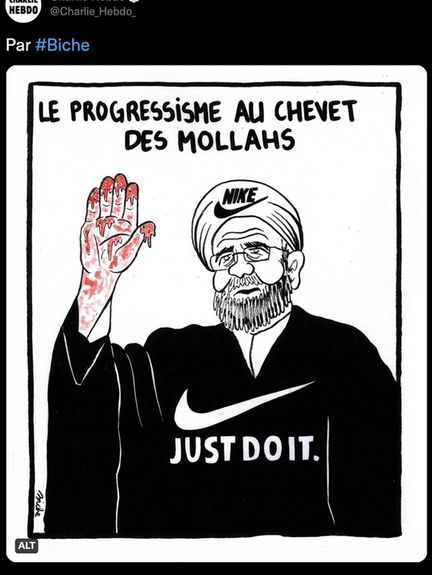
Iran’s Foreign Ministry has summoned the French chargé d'affaires in Tehran over France’s stance toward protests in Iran sparked by the death of a hijab victim.

Iran’s Foreign Ministry has summoned the French chargé d'affaires in Tehran over France’s stance toward protests in Iran sparked by the death of a hijab victim.
"In response to the interventionist statement of the French Ministry of Foreign Affairs, the participation of three French officials in protests in Paris and the ridiculous action of Charlie Hebdo magazine, the chargé d'affaires of the French Embassy in Tehran was summoned to the Ministry of Foreign Affairs," state-run media reported on Thursday.
The head of the Second Bureau of West Europe at Iran’s Foreign Ministry told the French diplomat that Iran strongly condemns the intervention of the French Foreign Ministry and some French officials in Iran’s domestic affairs.
He also blamed the French officials of playing “a dual role”, by hosting groups that have been directly involved in unrest across Iran over the past years on the one hand, and by condemning the Iranian police for clashing with the same “rioters” on the other hand.
On September 26, France reiterates its condemnation in the strongest possible terms of the Iranian security apparatus’ violent repression of the protests that have followed the shocking death of Mahsa Amini, the 22-year-old Kurdish girl who died due to several blows on her head in the hands of hijab police.
“France condemns all forms of violence, the arbitrary arrest and detention of protestors, as well as the gross violations of women’s rights and the freedom of expression via the blocking of news sites and social media. France also condemns the arbitrary arrest of journalists in the course of their work,” read a statement.
Spain summoned the Iranian ambassador Wednesday to convey Madrid’s “absolute condemnation” of the Islamic Republic's violence against peaceful protestors.
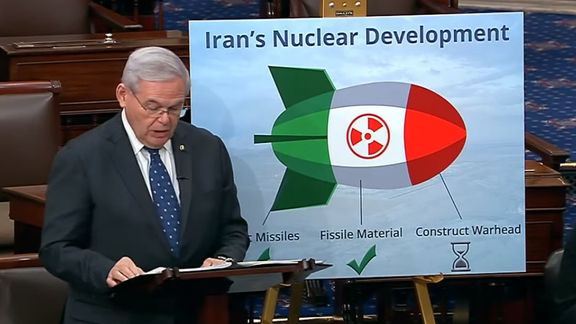
Several US senators told Iran International that Washington should stop talks with the Islamic Republic over revival of the 2015 nuclear deal, especially considering the ongoing popular protests.
Democratic Senator from New Jersey Bob Menendez, who is the chairman Senate Foreign Relations Committee, told our correspondent that the United States should get ready for the fall of the regime in Iran, noting that the last time Iranians revolted against the government, the US did not have any plans.
“I hope we'd be ready, and we'd have our contingencies and engagement, because we lost in the Green Revolution, we should be able to be ready for it now,” he said.
Utah’s Republican Senator Mitt Romney also voiced his support for the popular uprising of the Iranians -- triggered by the death of 22-year-old woman Mahsa Amini in the hands of hijab police – saying that currently it is not a good idea to be negotiating with Iran on a nuclear deal. “Iran is a bad actor and providing more resources to them and relieving sanctions would be a big mistake.”
Echoing similar sentiments, Alabama’s Republican Senator Tommy Tuberville warned against further nuclear negotiations with Iran while the country is in turmoil. “We don't need to get back to that dialog with Iran. They're obviously having problems over there right now. They need to work out their own problems.”
Calling the Islamic Republic’s authorities “dictators,” he said he is not surprised that “the Iranian regime is clamping down on Iranian protesters.”
Republican Senator from North Carolina Thom Tillis described the Biden administration's plan to go back to negotiating table with Iran as “ill-advised,” underlining that the Islamic Republic is a “state sponsor of terror” that every year “invests hundreds of millions of dollars” to destabilize the Middle East.
He added that it is beyond his comprehension that the Biden administration “thinks it'd be wise to do anything that would bolster that leadership versus stand with the Iranian people who want change.”
Pennsylvania's Senator Pat Toomey, also a Republican, called on the Biden administration to voice very strong, clear support for the protesters, highlighting that they are “only protesting for basic human rights, and they deserve those rights.”
He told our Congressional reporter Arash Alaei that “I don't think we can get a workable nuclear deal with this regime.”
Toomey said he does not have the expertise to make a prediction about the collapse of the regime, adding that “Sadly we know authoritarian regimes are able to retain power for a long period of time even when they're not popular.”
Republican Senator Mike Rounds from South Dakota also urged the administration against negotiating with Iran right now, emphasizing that the Islamic Republic is “a terrorist state.”
He touched upon the suffering of Iranians under the regime, saying, “Once again they're using some of those same tactics against their own people.”
Stressing that the “terrorist” regime in power in Iran is different from the Iranians who are good people themselves, he said that “we're having a difficult time in trying to find common ground with them (the regime). And that hurts our ability to have a good relationship with the people of Iran.”
Chris Van Hollen, Maryland's Democratic senator, also denounced the Islamic Republic's “vicious crackdown” on protesters as a “gross violation of women's rights and human rights,” expressing satisfaction that Washington slapped sanctions on hijab police and some security officials involved in the crackdown on peaceful protesters.
The Treasury Department said last week that its Office of Foreign Assets Control (OFAC) isdesignating Iran’s Morality Police “for abuse and violence against Iranian women and the violation of the rights of peaceful Iranian protestors.”
However, he said repression is already brutal in Iran without a nuclear deal, “So the idea that entering an agreement would cause the Iranian regime to be more brutal in its crackdown doesn't make sense to me.” “A nuclear armed Iran is worse for the US and our allies than a non-nuclear Iran,” he said, implying support for revival of the Joint Comprehensive Plan of Action (JCPOA).
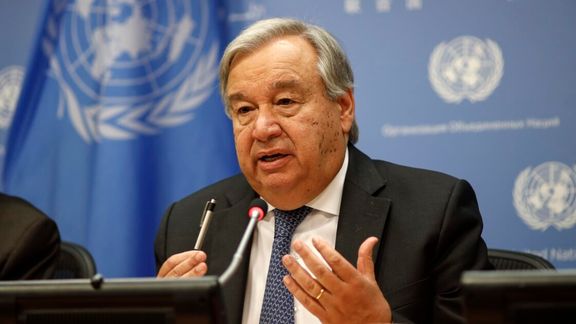
UN Secretary-General Antonio Guterres reiterated calls for an impartial investigation over the death of Mahsa Amini, the Iranian woman killed while in custody of police.
The Secretary General in a tweet demanded “a prompt, impartial and effective investigation by an independent competent authority,” as protests raged in Iran for nearly two weeks after Mahsa Amini died in hospital on September 16. Guterres added, “Human rights, including freedom of expression, peaceful assembly and association should be respected.”
It is not clear how many protesters have been killed Iran by security forces, but according to preliminary estimates the number is approaching at least one hundred.
The government has shut down the internet and deployed thousands of armed security forces in the streets of the Capital Tehran on Wednesday.
In a bilateral meeting in New York last week, Guterres had urged Iran’s hard-liner president Ebrahim Raisi that human rights, including freedom of expression and assembly were important, his spokesman Stephane Dujarric told the media.
"We are increasingly concerned about reports of rising fatalities, including women and children, related to the protests," Dujarric said in a statement.
The spokesman said last week that Guterres "calls on the security forces to refrain from using unnecessary or disproportionate force and appeals to all to exercise utmost restraint to avoid further escalation". He had also called for an impartial and effective investigation of Mahsa Amini’s death.
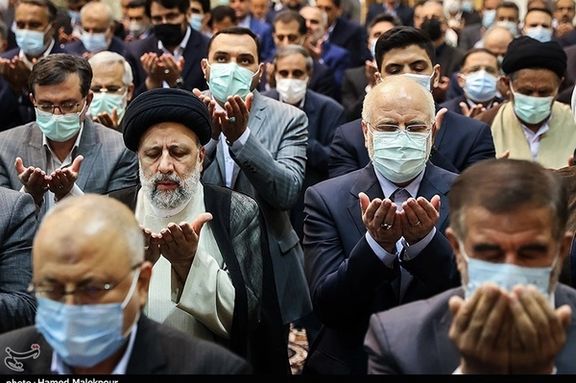
A hard-liner lawmaker in Iran says restrictions on Internet access will remain in place as long as street protests continue.
Although the Iranian government had hastened efforts to limit access to the Internet in August, it was after the start of nationwide protests following the death in custody of Mahsa Amini, a young woman from Iran's Kurdistan Province, on September 16 that the government imposed an Internet blackout for at least 16 hours a day.
A minimal intranet has been in place to facilitate some banking operations and access to online taxi services. Many Iranians have been complaining on social media that they have been trying several VPNs (virtual private networks) to circumvent the strict censorship and get online to read the news or post videos of the protests.
Lotfollah Siahkali, a hard-line lawmaker, has told the press on Wednesday, that “social media are the biggest venue for the enemies to further their conspiracies, thus, restrictions will continue as long as the protests continue."
Siahkali made the comment about continued restrictions while acknowledging that the Internet disruption causes a huge financial loss for the country on a daily basis. "We should restrict Internet access in the interest of security," he said. He further charged that "protesters are not part of the nation!"
Iran first introduced Internet restriction two decades ago, but the advent of social media created a whole new challenge for censorship.
The Iranian government had started to restrict Internet access gradually since President Ebrahim Raisi took office in 2021. The measure was initiated during the previous government but was continued with renewed rigor and momentum.
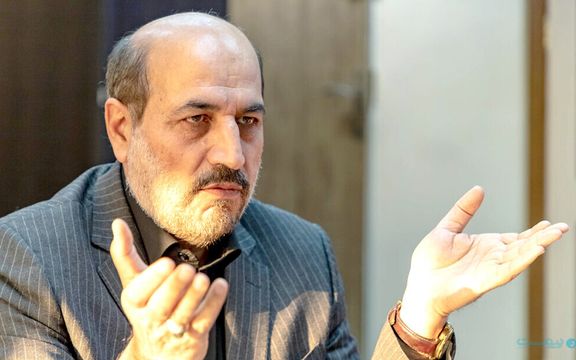
The international community, including the US government have criticized violation of human rights including restricting Internet access and vowed to help Iranians to have better access to the Internet. However, according to Donya-ye Eqtesad daily, most VPNs available in the market have been hacked and made useless by Iranian government's agents.
The daily further added that it is highly unlikely that the restrictions imposed on applications such as Instagram and WhatsApp would be lifted. The report by Donya-ye Eqtesad confirmed that Iranians are experiencing serious problems in accessing platforms such as Telegram, Twitter and YouTube even when they use VPNs.
The daily wrote that despite the restrictions, Instagram and WhatsApp were the most popular vehicles of sending videos and reports from Iran. But gradually, during the past 12 days when the protests have been raging on with full force, the government extended its censorship to other applications including LinkedIn, Skype, and Soundcloud. Meanwhile Google Play and Apple App Store have also been filtered to bar Iranians from downloading other applications that still have not been banned.
Iran's Communication Minister Isa Zarepour told Mehr News Agency on Wednesday, "We imposed restrictions on some of the social media platforms that had become vehicles for carrying the protesters messages." He stressed that restrictions would continue as long as the protests go on. However, most observers say the restrictions will remain there for good.
Responding to the concerns about the harm restrictive measures can do to hundreds of thousands of small business particularly on Instagram and Telegram, the official suggested that Iranian businesses should not use foreign applications for businesses. He added that the ministry is trying to develop Iranian applications to be used by the businesses. This is a promise Iranian officials have been making since 2009 when social media filtering first started by the Iranian government. However, a few applications the government has introduced have failed to become popular because the people do not trust them in terms of privacy.

Amid widespread disruption of Internet services in Iran, news and images trickle out Wednesday evening, but it is clear protests rage on in the capital Tehran.
Social media reports speak of heavy police, anti-riot troops, and Basij militia presence in the streets, while people try not to congregate in one location to avoid attacks, tear gas and in some instances gunfire.
One report from the capital’s eastern district of Narmak said government forces in hundreds have taken over major squares and intersections, not allowing crowds to gather, but people were shouting slogans against Supreme Leader Ali Khamenei.
Videos received at 21:30 local time show protests in the second largest city, Mashhad, an important religious center.
Iran International reported earlier that activists have intensified calls for labor and commercial strikes to put further pressure on the government. In the wake of these calls, oil industry workers issued statements threatening a general strike. A statement by oil contract workers and another by regular employees on Wednesday threatened that if the government does not stop its use of force and release all prisoners, they would start strikes.
The oil industry is the most critical sector in Iran’s economy and oil workers’ strikes played a major role in the 1979 revolution against the monarchy.
“We strongly condemn the murder of Mahsa Amini, which was in fact a warning to all of us and had no justification. Such a crime and other crimes cause great pain,” the regular employees of the government oil industry said.
“We announce our decisive support for the people’s protests in the streets, and we are part of the people whose life and human dignity have been trampled upon by the tyrannical government for more than 40 years,” the statement added.
Iran International cannot verify the full authenticity or details of videos posted on Twitter, but we use our best judgement to share what we believe is not disinformation.
Our live updates here ended at 01:15 Iran time on Thursday.
-----------------------------------------------------------------------------------------------------------------------------
----------------------------------------------------------------------------------------------------------------------------
Students at Esfahan University protesting on Wednesday, calling for nationwide support for change.
----------------------------------------------------------------------------------------------------------------------------
Wednesday, university students protest in Sabzevar, Khorasan-e Razavi Province.
----------------------------------------------------------------------------------------------------------------------------
-----------------------------------------------------------------------------------------------------------------------------
In Ekbatan, a district of Tehran, people were chanting death to Khamenei from their apartment windows. Last night, a group of Basij militia showed up at the township and fired with shotguns at windows to silence protesters.
-----------------------------------------------------------------------------------------------------------------------------
Large protests took place in Sanandaj, a large Kurdish city in western Iran, where people chanted slogans against Supreme Leader Ali Khamenei. No security forces are visible as the government has apparently focused on Tehran.
-----------------------------------------------------------------------------------------------------------------------------
Security forces lining the streets in Sadeghiyeh in western Tehran where there have been several protests over the past two weeks. One tweet said that most of the security forces were teenagers who seemed tired and disorganized.
-----------------------------------------------------------------------------------------------------------------------------
In Najafabad, a religious city of around 300,000 in Esfahan Province, just west of the historic city of Esfahan, protesters broke windows of the city’s famous seminary. No images available yet.
----------------------------------------------------------------------------------------------------------------------------
A video apparently sent from Tehran's Sattar Kahn district shows security forces lining up in the streets to prevent protests. The narrator says that some of these troops speak Arabic amongst themselves, possibly meaning that the Islamic Republic brought its proxy forces from Iraq or Lebanon to strengthen its military presense in the streets. There have been reports in the past that Arab militiamen were brought to Iran to suppress protests.
-----------------------------------------------------------------------------------------------------------------------------
Iran’s National Orchestra had to cancel a concert Wednesday evening after musicians refused to perform showing their solidarity with the protests.
-----------------------------------------------------------------------------------------------------------------------------
A video from Mashhad shows protesters surrounding a police car and overturning it in the street. Mashhad is Iran's second largest city and an important religious center.
-----------------------------------------------------------------------------------------------------------------------------
People shouting slogans from their windows in Chitgar, a western district of Tehran, Wednesday evening.
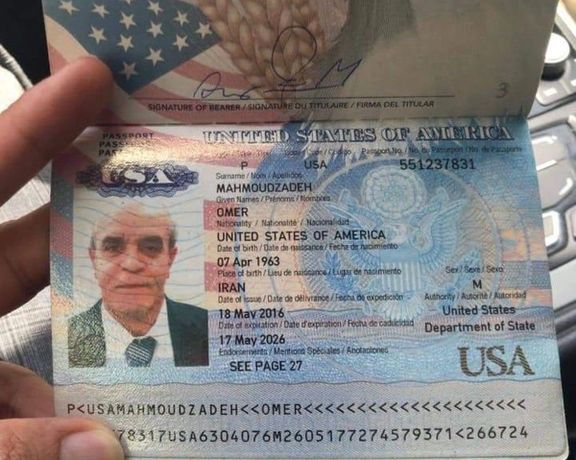
The United States has condemned the latest Iranian missile and drone attack on the Iraqi Kurdistan region, which reportedly killed an American citizen residing in the area.
Iran International learned late on Wednesday that a US citizen named Omar Mahmoudzadeh, aka Chicho, has been killed in the IRGC's missile and drone attacks against the positions of Kurdish groups opposed to the Islamic Republic in Iraqi Kurdistan. He lived in the US since 1990s.
The Erbil Emergency has confirmed to Iran International’s correspondent that a pregnant woman named Reyhaneh has been killed in the IRGC drone and missile strikes on Wednesday.
Condemning the unprovoked attacks, the US CENTCOM said, “Such indiscriminate attacks threaten innocent civilians & risk the hard-fought stability of the region. No US forces were wounded or killed as a result of strikes."
The CENTCOM also announced that "US forces brought down an Iranian Mohajer-6 drone headed in the direction of Erbil as it appeared as a threat to CENTCOM forces in the area. CENTCOM forces, in support of partnered forces in Iraq, are assessing the situation.”
The US State Department also condemned Iran's use of ballistic missiles and drone attacks against the Iraqi Kurdistan region, calling it "an unjustified violation of Iraqi sovereignty and territorial integrity." “We further condemn comments from Iran government’s threatening additional attacks against Iraq.”
Amid nationwide protests in Iran sparked by the death in custody of a Kurdish girl, Iran’s Revolutionary Guard attacked the region for the fifth consecutive day, apparently aimed at intimidating the Kurds.